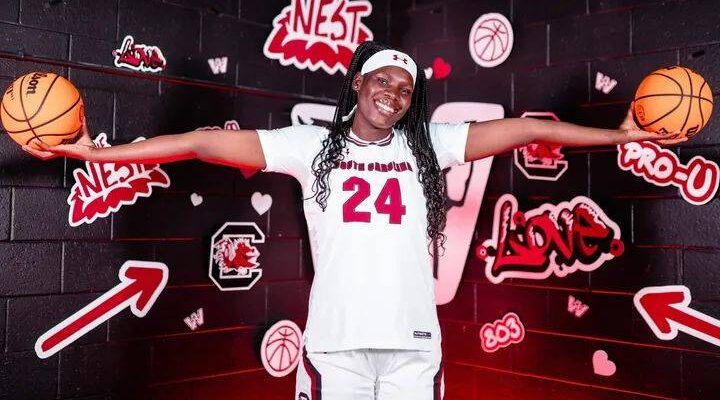How South Carolina Made an Indelible Impression on Transfer Madina Okot — Even Under the Reign of Dawn Staley
When Madina Okot made the decision to transfer to the University of South Carolina, it was far more than a simple change of uniform or a switch in geographic location. It was a transformative decision that reflected her ambition, mindset, and vision for her future in collegiate basketball. What made the move especially remarkable was how South Carolina, under the leadership of Dawn Staley—one of the most celebrated figures in women’s basketball—managed to impress and inspire Okot deeply, even while commanding the weight of a storied program already steeped in success and high expectations.
This story is not merely about a player changing teams; it’s about the magnetic culture Dawn Staley and South Carolina have cultivated, a culture that resonates with athletes like Okot who seek not just to compete, but to thrive and evolve. To fully appreciate how South Carolina made such an impression on Madina Okot, it’s essential to unpack multiple layers: the state of the program when she arrived, the coaching philosophy of Staley, the team’s identity, the support system, and the personal connection that ultimately sealed the deal.
Madina Okot’s basketball journey reflects the determination of a player eager to carve out a prominent role and grow within a top-tier basketball environment. Before arriving at South Carolina, Okot had already demonstrated her talents on the court but sought a program that would challenge her, support her ambitions, and elevate her game to the next level.
Her transfer decision was not made lightly. Many athletes transfer seeking better playing time, coaching, or academic fit. For Okot, South Carolina’s appeal went beyond just basketball metrics; it was about joining a team that not only competes for championships but also shapes individuals into leaders and champions on and off the court.
Central to South Carolina’s appeal is Dawn Staley herself. A Hall of Famer and Olympic gold medalist, Staley is not only an elite basketball mind but a transformational leader. She has built a program that consistently reaches the NCAA Final Four and claims national titles while maintaining a strong commitment to player development, empowerment, and community impact.
For Madina Okot, the chance to be coached by Staley represented an opportunity to learn from one of the best. Staley’s coaching extends beyond X’s and O’s; it’s about fostering confidence, resilience, and leadership in her players. Staley’s reputation as a mentor and role model likely played a huge role in attracting Okot.
South Carolina’s program operates under a culture that demands excellence in every facet — from practice intensity to academic achievement and community involvement. This culture, heavily influenced by Staley’s own values, emphasizes accountability and teamwork.
Okot, upon visiting or interacting with the team, would have noticed the standard set for every player. It’s a place where talent is nurtured, but hard work is non-negotiable. The atmosphere is competitive but supportive, with veterans encouraging newcomers and coaches pushing players to be their best selves.
This culture helps players like Okot understand that success is a collective endeavor. Even if she joined a team with high expectations and established stars, she would be welcomed as an integral part of the team’s future, valued for her unique contributions.
South Carolina’s approach to player development is comprehensive and personalized. Dawn Staley and her staff are known for tailoring training programs to the needs of each athlete, helping them grow physically, mentally, and skill-wise.
For Okot, transferring to South Carolina meant access to top-notch facilities, expert strength and conditioning coaches, nutritionists, and sports psychologists. It meant getting individualized feedback and training that would hone her skills, expand her basketball IQ, and prepare her for professional opportunities beyond college.
Moreover, Staley’s emphasis on defense, versatility, and basketball intelligence meant Okot would be challenged to elevate all aspects of her game, making her a more complete player.
South Carolina’s teams under Staley are known for their defensive tenacity and mental toughness. They play with passion, discipline, and a relentless will to win. This identity creates a strong bond among teammates, who learn to trust and rely on each other in high-pressure situations.
For Madina Okot, stepping into this environment offered a clear pathway to growth. She would be surrounded by peers who embraced the same toughness and commitment, fostering an environment where every practice and game was an opportunity to improve and contribute.
This identity likely appealed to Okot’s competitive spirit. It’s one thing to play for a winning program; it’s another to be part of a team that defines itself by grit and resilience.
What sets South Carolina apart is its commitment to making an impact off the court. Staley’s program is deeply engaged in the local community and places importance on players being role models and leaders beyond basketball.
For Okot, this dimension would be crucial. It represents a chance to build a legacy, inspire younger athletes, and grow personally. Staley’s emphasis on leadership development and community service offers players an experience that shapes them holistically.
Transfers are ultimately personal decisions. Beyond the program’s reputation and facilities, there has to be a genuine feeling of belonging and trust. Okot’s decision to join South Carolina suggests she found that connection.
Whether through conversations with Dawn Staley, interactions with teammates, or witnessing the program’s culture firsthand, Okot saw South Carolina as a place where she could thrive, contribute meaningfully, and pursue her dreams.
The welcoming atmosphere, the professionalism, and the shared vision for success all made an impression that transcended just basketball logistics.
Joining a powerhouse like South Carolina also meant facing challenges. Okot would need to adapt to a higher level of competition, both in practice and games. She would have to navigate team dynamics, earn playing time, and embrace the demands of being part of a nationally ranked team.
However, these challenges are also growth opportunities. With Staley’s guidance and the support of her teammates, Okot would be pushed to raise her standards and develop resilience.
Madina Okot’s transfer story reflects a broader trend. South Carolina’s rise as a premier women’s basketball destination has made it attractive to transfers seeking competitive environments, excellent coaching, and a chance to compete for championships.
The program’s sustained success, coupled with Staley’s leadership, has created a magnet effect for players who want to join a winning culture while developing as athletes and leaders.
Madina Okot’s move to South Carolina represents more than just a roster change for the Gamecocks; it’s a testament to how the program under Dawn Staley has created an environment that deeply impresses and attracts players.
Through a culture of accountability, top-tier player development, an identity rooted in toughness, and a community-focused approach, South Carolina offers an experience that aligns with the ambitions of players like Okot.
Her transfer underscores the power of leadership and culture in shaping athletes’ decisions and careers. Under Dawn Staley, South Carolina is not just a team—it’s a family, a forge of champions, and a beacon for those seeking to excel on and off the court.



